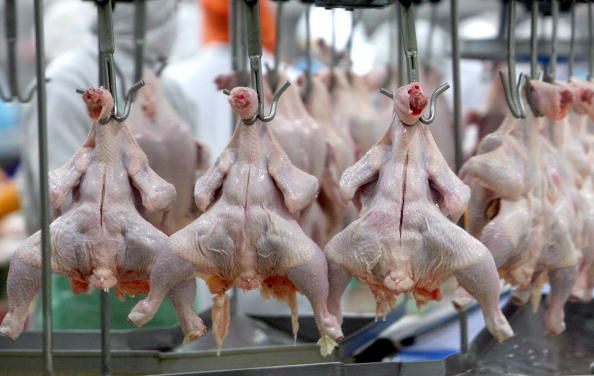Stop Washing Raw Chicken: CDC Tips For Cooking Meat Safely

In an April 26 tweet sent out by the Centers for Disease Control and Prevention (CDC), the agency reminded people not to wash raw chicken before cooking and other safety measures to follow to make sure they don’t get food poisoning.
Don’t wash your raw chicken! Washing can spread germs from the chicken to other food or utensils in the kitchen. https://t.co/QlFpd1alG3 pic.twitter.com/bLB1ofcuh7
— CDC (@CDCgov) April 26, 2019
“Americans eat more chicken every year than any other meat. Chicken can be a nutritious choice, but raw chicken is often contaminated with Campylobacter bacteria and sometimes with Salmonella and Clostridium perfringens bacteria. If you eat undercooked chicken or other foods or beverages contaminated by raw chicken or its juices, you can get a foodborne illness, which is also called food poisoning,” the CDC said on the page linked in the tweet.
The reason given by the health officials for not washing raw chicken prior to consuming it was that juices from the meat can spread in the kitchen and contaminate other foods, utensils, and countertops.
Here are a few other tips to properly handle, cook and store raw chicken, as advised by the CDC.
- Raw chicken must be stored in a disposable bag from the moment it is put in the shopping cart, to prevent raw juices from getting onto other foods. The same logic should be followed while storing the uncooked chicken in the refrigerator.
- Before and after handling the meat, hands must be washed with warm soapy water for 20 seconds.
- A separate cutting board must be used for chicken. No other cooked food or fresh produce should share the same plate, cutting board, or other surfaces that previously held raw chicken. After chicken has been prepared, all the surfaces that touched the raw meat should be rinsed thoroughly with soap and water.
- Chicken should ideally be cooked at the internal temperature of 165 degrees Fahrenheit, as it helps kill the harmful bacteria and germs in the meat. If one is unsure about the temperature, the safest method is always to use a food thermometer. Microwavable chicken meals should be cooked in the same way as the raw product.
- The key to avoiding food poising from chicken is to never consume it uncooked. If one is unsure about any particular chicken preparation in a restaurant, the safer option is to send it back and request a do over.
- Leftover chicken must be stored in the freezer within two hours (or within an hour if the temperature outside is higher than 90 degrees Fahrenheit).
Not every Twitter user reacted positively to CDC’s reminder, saying they would rather stick to their traditional way of preparing chicken.
“Sorry, I follow the rules of my 92-year old mother’s kitchen,” wrote one Twitter user. "They haven’t failed me yet.”
Another user wrote: “Many Americans wash their protein and know how to clean their kitchen afterwards to kill germs if any have spread. Also, in my family, we don’t cook unless the kitchen is clean so there would be no utensils in the sink to speak of."
After receiving some criticism, CDC wrote in a follow-up tweet Monday: “We didn’t mean to get you all hot about not washing your chicken! But it’s true: kill germs by cooking chicken thoroughly, not washing it. You shouldn’t wash any poultry, meat, or eggs before cooking. They can all spread germs around your kitchen."
© Copyright IBTimes 2025. All rights reserved.






















